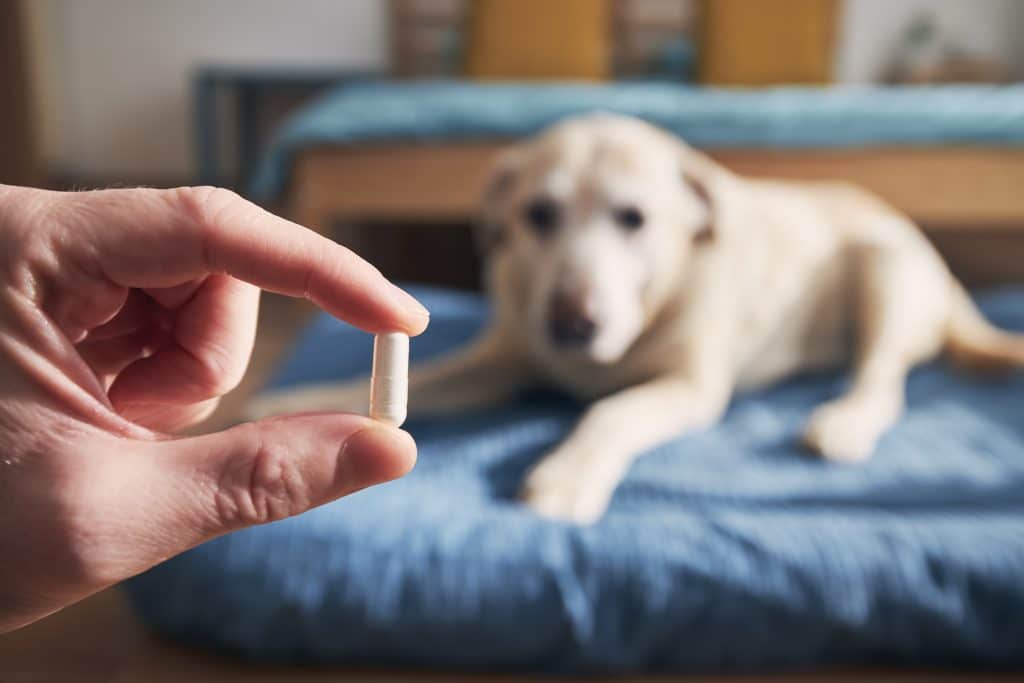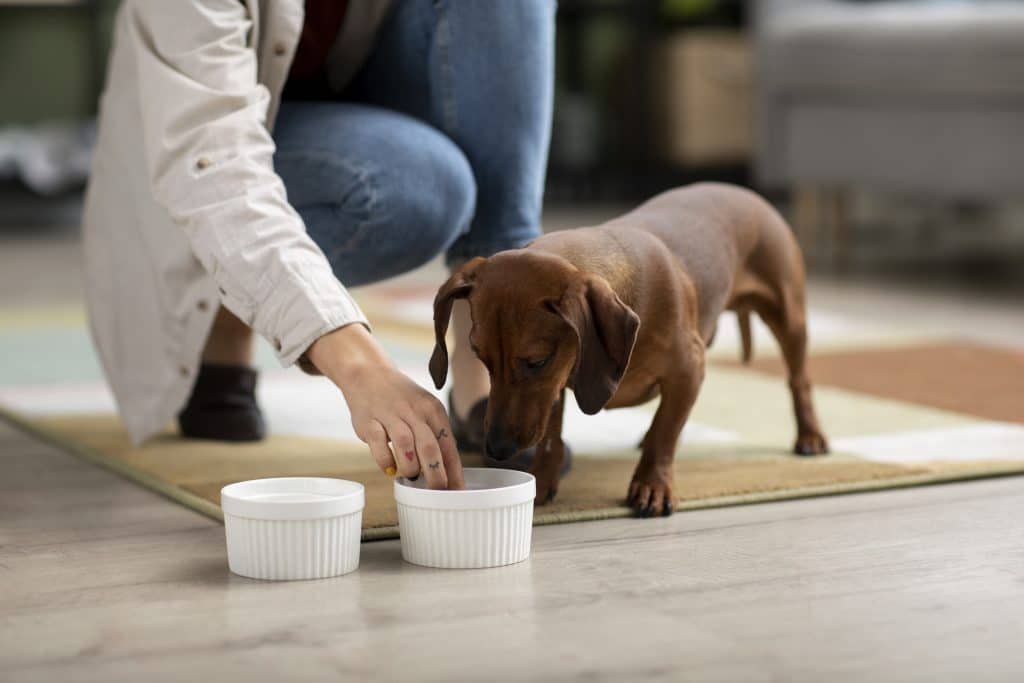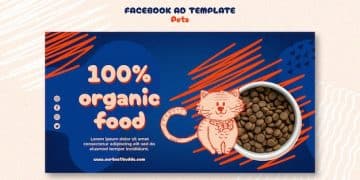Probiotics for pets: Improve digestion and boost immunity

Anúncios
Providing probiotics for pets can significantly enhance their digestive health and bolster their immune system, leading to improved nutrient absorption, reduced gastrointestinal issues, and stronger natural defenses against illness.
Every pet owner desires a happy, healthy companion. While a balanced diet and regular exercise are foundational, a lesser-known but equally vital component of pet wellness is gut health.
Anúncios
From addressing common digestive upsets to strengthening their natural defenses, understanding the power of these beneficial microorganisms can transform your pet’s vitality.
Understanding pet gut health: The foundation
The gut microbiome in pets, much like in humans, is a complex ecosystem of trillions of microorganisms.
These include bacteria, fungi, and viruses, all coexisting within the gastrointestinal tract.
Anúncios
A healthy microbiome, characterized by a diverse and balanced population of beneficial microbes, plays a pivotal role in digestion, nutrient absorption, and immune function.
When this delicate balance is disrupted, a condition known as dysbiosis, pets may experience a range of health issues.
The inclusion of probiotics for pets can help restore that balance and maintain overall gut harmony.
The gut-brain axis in pets
Recent research has shed light on the intricate connection between the gut and the brain, often referred to as the “gut-brain axis.”
This bidirectional communication system influences mood, behavior, and overall neurological health in pets.
A disrupted gut microbiome can contribute to anxiety, stress, and even cognitive decline.
Conversely, a healthy gut can promote calmness and enhance cognitive function, contributing to a more balanced and happy pet.
Probiotics for pets play a role in maintaining this connection, improving both mood and gut stability.
- Digestive harmony: A balanced gut ensures efficient breakdown and absorption of nutrients.
- Immune system support: A significant portion of the immune system resides in the gut.
- Behavioral impact: Gut health can directly influence mood and reduce anxiety.
Factors that can disrupt a pet’s gut microbiome include dietary changes, stress, antibiotic use, environmental toxins, and aging.
Each can lead to an imbalance where harmful bacteria outcompete beneficial ones, paving the way for chronic health problems.
Recognizing these triggers is the first step toward proactive gut health management.
Addressing these imbalances through diet and probiotics for pets can restore microbial diversity and function.
Probiotics: What they are and how they work
Probiotics for pets are live microorganisms, typically bacteria or yeasts, that confer health benefits when consumed in adequate amounts.
These beneficial microbes colonize the intestinal tract, helping to restore and maintain a healthy balance of gut flora.
They compete with harmful bacteria for resources and attachment sites, suppressing their growth and reducing infections and inflammation.
The mechanisms by which probiotics for pets exert their beneficial effects are multifaceted.
They produce short-chain fatty acids (SCFAs), serve as energy sources for intestinal cells, and modulate the immune system, enhancing natural defenses and reducing hypersensitivity.
Key probiotic strains for pets
Not all probiotic strains are created equal. Some of the most common and well-researched strains for canine and feline health include:
- Lactobacillus acidophilus: Supports digestion and helps produce lactic acid, hindering harmful bacteria.
- Bifidobacterium animalis: Known for reducing diarrhea and improving stool quality.
- Enterococcus faecium: Contributes to a balanced gut microbiome and strengthens the immune response.
- Saccharomyces boulardii: A beneficial yeast that helps manage antibiotic-induced diarrhea and supports intestinal health.
Beyond microbial action, probiotics for pets maintain intestinal barrier integrity.
A compromised barrier allows harmful substances to enter the bloodstream, triggering systemic inflammation.
By strengthening this barrier, probiotics for pets help prevent toxin leakage and promote overall health.

Improving digestion: A core benefit
One of the most immediate and noticeable benefits of probiotics for pets is improved digestive health.
A balanced gut ensures efficient nutrient breakdown and absorption, reducing gastrointestinal issues and promoting comfort.
They enhance enzymatic activity, improving digestion of complex carbohydrates, proteins, and fats. This efficiency minimizes fermentation in the colon, reducing gas and bloating.
For pets with sensitive stomachs, probiotics for pets can bring relief and long-term stability.
Addressing common digestive issues
Many pets suffer from chronic or acute digestive problems, which can be distressing. Probiotics for pets offer a natural and effective way to manage conditions such as:
- Diarrhea: Whether caused by diet change, stress, or antibiotics, probiotics can restore gut regularity.
- Constipation: By promoting healthy motility, probiotics alleviate occasional constipation.
- Gas and bloating: A balanced microbiome reduces gas-forming bacteria.
Pets on antibiotics often lose beneficial gut bacteria. Administering probiotics for pets during and after treatment helps repopulate the gut and minimizes side effects like diarrhea.
For pets with allergies, probiotics for pets improve gut lining integrity, reducing allergic reactions and promoting immune tolerance.
Boosting immunity: A stronger defense system
Beyond digestion, one of the most profound benefits of probiotics for pets is their ability to boost the immune system.
The gut is the largest immune organ, housing 70% of immune cells. A healthy microbiome, supported by probiotics for pets, ensures robust immune defense.
They stimulate immune cells such as T-cells and natural killer cells while increasing immunoglobulins like IgA, which defend mucosal surfaces.
Modulating the immune response
A balanced microbiome teaches the immune system to distinguish between harmful and harmless substances.
This prevents overreactions like allergies or autoimmune conditions.
By promoting tolerance, probiotics for pets reduce the incidence and severity of immune-mediated diseases.
- Reduced infections: Stronger immunity means fewer bacterial and viral infections.
- Allergy mitigation: Probiotics can regulate immune responses to allergens.
- Faster recovery: Enhanced immunity supports quicker recovery from illness.
Choosing the right probiotic for your pet
Selecting the appropriate probiotics for pets requires careful consideration of strain, CFUs, and delivery method.
For example, Bifidobacterium animalis is excellent for acute digestive issues, while multi-strain formulas support general wellness.
Always check for third-party testing and avoid unnecessary additives. Consult a veterinarian to determine the correct dosage and duration.
Personalized advice ensures safe and effective use of probiotics for pets for maximizing health and immunity.
Tips and best practices
Once you’ve selected the right probiotics for pets, consistency is key. They work best when administered daily, helping maintain a stable gut microbiome.
If your pet is on antibiotics, give the probiotic a few hours apart from the antibiotic dose.
Incorporating probiotics into your pet’s routine
The best administration method depends on your pet’s preferences:
- Powders: Sprinkle directly on food or mix with water (avoid heat).
- Capsules: Hide in treats or open to mix with food.
- Chews: Palatable and easy to give.
Monitor your pet’s reaction. Mild gas or loose stools can occur initially but usually subside.
Store probiotics for pets properly, many require refrigeration to maintain live culture viability.
Remember, probiotics are a supplement, not a cure-all. Combined with a balanced diet and exercise, probiotics for pets can greatly enhance long-term vitality.
Real-world impact: Testimonials and case studies
Real-world experiences often illustrate the transformative power of probiotics for pets.
Pet owners and veterinarians report improved digestion, immunity, and even mood stabilization.
Pets with chronic diarrhea or vomiting often show dramatic recovery, confirming the benefits of these supplements.
Transformative pet health stories
Consider “Buddy,” a Labrador with IBS. After adding probiotics for pets to his routine, his symptoms decreased, and he regained energy.
“Whiskers,” an elderly cat with immune issues, also showed improvement in energy and coat health after probiotic use.
These cases demonstrate the wide-ranging impact of probiotics for pets on overall wellness and longevity.
Potential side effects and considerations
While probiotics for pets are generally safe, mild side effects may occur as the gut adjusts—temporary gas, bloating, or stool changes.
Introduce them gradually and monitor your pet’s response.
If symptoms persist or severe reactions occur, stop use and consult a veterinarian.
Pets with serious immune conditions should only take probiotics for pets under veterinary supervision.
Choose high-quality, tested products to avoid contamination and ensure purity.
When administered thoughtfully, probiotics for pets deliver safe, lasting benefits for digestion, immunity, and vitality.
| Key Benefit | Brief Description |
|---|---|
| 💚 Enhanced Digestion | Promotes nutrient absorption and reduces common GI issues like gas and diarrhea. |
| 🛡️ Stronger Immunity | Supports the gut’s extensive immune system, boosting defenses against pathogens. |
| ⚖️ Balanced Microbiome | Restores healthy gut flora, outcompeting harmful bacteria and preventing dysbiosis. |
| ✨ Improved Well-being | Contributes to better coat, skin, mood, and overall vitality for a happier pet. |
Frequently Asked Questions (FAQ) about Probiotics for Pets
Probiotics are live beneficial microorganisms that, when administered in adequate amounts, provide health benefits to your pet. They are crucial for maintaining a healthy balance of gut bacteria, which directly impacts digestion, nutrient absorption, and immune system function, contributing to overall pet wellness.
Probiotics enhance digestion by breaking down food more efficiently and improving nutrient absorption. They help balance the gut flora, reducing issues like gas, bloating, diarrhea, and constipation, leading to more regular and healthier bowel movements for your pet.
Yes, approximately 70% of a pet’s immune system resides in the gut. Probiotics support immune health by modulating immune responses, stimulating beneficial immune cells, and strengthening the gut barrier, making your pet less susceptible to infections and allergic reactions.
Generally, probiotics are safe with minimal side effects. Some pets might experience mild gas or temporary loose stools as their gut adjusts. These symptoms are usually brief and resolve on their own. If severe or persistent, consult your veterinarian.
Look for products that list specific strains (e.g., Lactobacillus, Bifidobacterium), have a high CFU count (billions), and are from reputable brands with third-party testing. Consider your pet’s specific needs and always consult your veterinarian for personalized recommendations.






